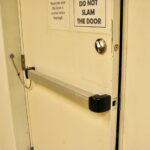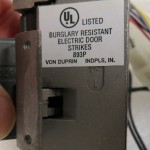This post was printed in the March 2013 issue of Doors & Hardware
Question: I need to install 2 card readers and the associated electrified hardware on existing doors. There is no other construction or wiring being done. Am I required to apply for a permit in order to perform this work?
Answer: My guess is that a fair amount of these installations are still being done without any permits. But in most cases a permit IS required – sometimes several different types of permits.
According to the International Building Code (IBC), a building permit is required to erect, install, enlarge, alter, repair, remove, convert or replace any electrical system (and other systems) where the installation is regulated by the code. For an emergency repair, the building permit application must be submitted on the next business day.
The IBC contains exceptions for work that does not require a permit, and for electrical work those exceptions include minor repair work including replacement of lamps and connecting portable equipment to permanent outlets, radio and television transmission equipment, and temporary systems for testing or servicing electrical equipment. The exceptions do not include access control systems or the installation of electrified hardware, so this work does require a permit.
2009 International Building Code:
Section 105 Permits
105.1 Required. Any owner or authorized agent who intends to construct, enlarge, alter, repair, move, demolish, or change the occupancy of a building or structure, or to erect, install, enlarge, alter, repair, remove, convert or replace any electrical, gas, mechanical or plumbing system, the installation of which is regulated by this code, or to cause any such work to be done, shall first make application to the building official and obtain the required permit.
Exceptions related to electrical work (consult the code for other exceptions):
105.2 Work exempt from permit. Exemptions from permit requirements of this code shall not be deemed to grant authorization for any work to be done in any manner in violation of the provisions of this code or any other laws or ordinances of this jurisdiction. Permits shall not be required for the following:
Electrical:
Repairs and maintenance: Minor repair work, including the replacement of lamps or the connection of approved portable electrical equipment to approved permanently installed receptacles.
Radio and television transmitting stations: The provisions of this code shall not apply to electrical equipment used for radio and television transmissions, but do apply to equipment and wiring for a power supply and the installations of towers and antennas.
Temporary testing systems: A permit shall not be required for the installation of any temporary system required for the testing or servicing of electrical equipment or apparatus.
In addition to or in lieu of a building permit, some jurisdictions require permits issued by the fire marshal or another department. Depending on the extent of the work being performed, access control integrators may be required to involve an architect or engineer, and provide detailed drawings and information about the system. Some jurisdictions require special permits for the use of electromagnetic locks, because of the risks associated with installing them without the proper releasing methods. Most of the required permits will result in one or more inspections by the Authority Having Jurisdiction (AHJ). It’s best to check with your local building inspector, electrical inspector, and fire marshal to cover your bases.
In conjunction with permits, it’s also important to consider licensing requirements, which may range widely from one jurisdiction to another. Some jurisdictions do not require a specific license for this work, while others require a low-voltage license to do something as simple as installing an electric strike. It’s imperative that access control integrators are aware of the licensing requirements in the areas where they are performing this work.
For example, in the jurisdiction where I live and work, an access control installer must have, at minimum, a Systems Technician license. This license requires 4,000 hours of practical experience supervised by a licensed Systems Technician, as well as 300 hours of approved educational instruction. Once this license is achieved, the technician may apply for a Systems Contractor license after working as a licensed Systems Technician for one year and successfully completing a minimum of 75 hours of classroom instruction on the appropriate electrical code. A licensed Systems Contractor may apply for permits – a Systems Technician may not. An additional license, called an S-License, is required in our state (Massachusetts) for anyone who installs, repairs, or maintains security systems, CCTV/surveillance systems, or access control systems. The review process for the S-License includes a background check and references verifying the reputation of the applicant.
What is the penalty for installing access control systems without a license or permit? It varies widely, but can range from double the permit fee to thousands of dollars, not to mention the potential liability if the work is not done in a code-compliant manner and results in injury or worse. The AHJ may require hardware and wiring to be removed or changed if it was not approved up-front, impacting the reputation and profitability of the integrator. Is it worth the risk?
This post was originally created on December 6, 2012, and was updated and printed in the March 2013 issue of Doors & Hardware magazine.
You need to login or register to bookmark/favorite this content.






Not only are they required, specific licenses are required to pull each permit.